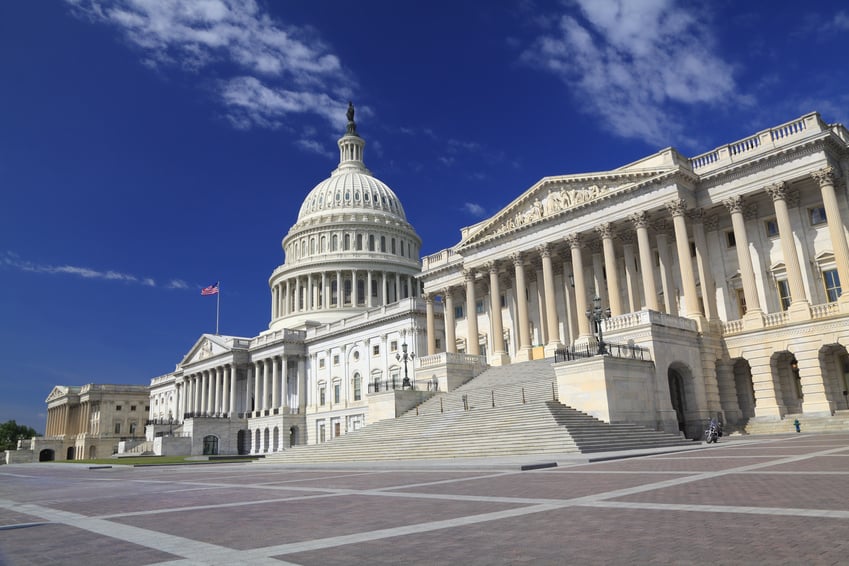According to a recent U.S. Department of Justice (“DOJ”) Inspector General’s Office (“IG”) report,[1] DOJ is not enforcing the Foreign Agents Registration Act[2] (“FARA”), which governs foreign lobbying in the United States, aggressively enough. FARA, which was passed in 1938 to combat the threat of Nazi propaganda, requires anyone engaged in certain forms of activity on behalf of foreign principals to register with DOJ and to publicly disclose details of their representation, including amounts received.[3] Penalties for non-compliance include up to five years in prison and a $10,000 fine.[4] (For more details, see “What FARA Requires” below.)
IG Report: Main Findings
- The eight-person FARA team is poorly funded and lacks power to compel possible violators to produce information, relying instead on voluntary disclosure.
- 62 percent of new registrants filed documents late; 50 percent of registrants failed to file required supplemental statements; 15 percent of active registrants “had ceased filing altogether or were over six months delinquent.”[5] The IG concluded that “these compliance rates are unacceptable.”
- Federal Bureau of Investigation (“FBI”) counterintelligence agents, prosecutors, and DOJ’s National Security Division (“NSD”) officials have different understandings of what factually constitutes a “FARA case.”
- The IG made 14 recommendations, which include: (1) expanding information sources to help DOJ identify potential or delinquent foreign agents; (2) strengthening DOJ’s tracking system for registration files and timely compliance by foreign agents; and (3) coordinating FARA enforcement with DOJ’s national security initiatives.[6]
Stricter FARA Enforcement Expected in the Near Future:
- The NSD, which enforces FARA, is already pursuing civil investigative demand (CID) authority from Congress to enhance its ability to investigate possible violations.[7]
- The NSD plans to evaluate additional legislative changes to close current loopholes, culminating in a report due next September.
- The NSD stated its officials “agree with the report’s recommendations and in fact had already taken steps relating to several of the IG’s observations prior to the audit,” suggesting imminent reform and more consistent enforcement.[8]
Public attention is increasingly focused on potential FARA violations, despite its past inconsistent enforcement. Recent newsworthy examples include:
- Paul Manafort: Recent media reports state he “helped a pro-Russian governing party in Ukraine secretly route at least $2.2 million in payments to two prominent Washington lobbying firms in 2012.”[9] Both firms stated they were assured the payments came from a Brussels-based nonprofit, not a governmental or political party, but DOJ and the FBI are nevertheless investigating both firms.[10]
- Gov. Terry McAuliffe: The Virginia Government is currently under investigation concerning his foreign sources of income before taking office.[11] Reports have cited a $120,000 contribution to McAuliffe’s 2013 gubernatorial campaign made by Chinese businessman Wang Wenliang, who also donated millions of dollars to the Clinton Foundation. The investigation is also reportedly focused on McAuliffe’s former role on the Clinton Global Initiative’s board of directors.[12]
- Former Members of Congress: Politico reported this week that of the 1,009 members of Congress who have left Capitol Hill since 1990, 114 of them – over 11 percent – have lobbied for or otherwise represented a foreign government, foreign-owned company or think tank.[13]
What FARA Requires:
- FARA requires persons acting as agents of foreign principals in a political or quasi-political capacity to register with DOJ and file disclosure forms outlining the purpose of their representation, as well as their activities, income, and expenditures on behalf of the foreign principal. Registration may also be required for activities such as public relations and tourism on behalf of the foreign principal.
- An “agent of a foreign principal” representing a foreign government, individual, or entity influenced or funded by a government or party is required to register with DOJ within 10 days of agreeing to provide representation in the United States.[14] The agent must then file reports every six months detailing their activities on behalf of the foreign principal.[15]
Recommended Action:
- Keep in mind that FARA is a broad-reaching statute. As the Manafort example shows, even activity with a nonprofit think tank may qualify for enforcement action depending on its political goals.
- Conduct an internal review of your activities with all foreign entities as well as the entities’ political interests. Analyze whether you may possibly act in a political or quasi-political capacity on behalf of a political or quasi-political foreign principal.
- Depending on the results of your internal review, analyze whether any of these activities may fall under one of the limited exceptions to FARA, such as the separate filing requirement under the Lobbying Disclosure Act (“LDA”).
[1] Office of the Inspector Gen., U.S. Dep’t of Justice, Audit of the National Security Division’s Enforcement and Administration of the Foreign Agents Registration Act (Sept. 2016), https://oig.justice.gov/reports/2016/a1624.pdf.
[2] 22 U.S.C. § 611 et seq.
[3] Megan R. Wilson, DOJ Watchdog: Foreign Lobbying Enforcement Lax, The Hill (Sept. 7, 2016), http://thehill.com/business-a-lobbying/business-a-lobbying/294801-doj-watchdog-foreign-lobbying-enforcement-lax.
[4] 22 U.S.C. § 618(a).
[5] See supra note 1, at 16.
[6] Id. at 32-36.
[7] See id. at ii-iii.
[8] Eric Tucker, Justice Dept. Criticized Over Foreign Lobbying Enforcement, Wash. Post (Sept. 7, 2016), https://www.washingtonpost.com/politics/justice-dept-criticized-over-foreign-lobbying-enforcement/2016/09/07/91f483f4-7508-11e6-9781-49e591781754_story.html.
[9] Desmond Butler & Jeff Horwitz, AP Sources: Manafort Tied to Undisclosed Foreign Lobbying, Associated Press (Aug. 17, 2016), http://bigstory.ap.org/article/c01989a47ee5421593ba1b301ec07813/ap-sources-manafort-tied-undisclosed-foreign-lobbying.
[10] Chad Day & Jeff Horwitz, Trump Advisers Waged Covert Influence Campaign, Associated Press (Aug. 18, 2016), http://bigstory.ap.org/article/6eed1ef61eb744e1aac584f8ac1f7247/trump-advisers-waged-covert-influence-campaign.
[11] Matt Zapotosky, Report: Justice Dept. is Divided on Intent of Law It’s Using to Investigate McAuliffe, Wash. Post (Sept. 7, 2016), https://www.washingtonpost.com/world/national-security/report-justice-dept-is-divided-on-intent-of-law-its-using-to-investigate-mcauliffe/2016/09/07/274ddbd2-7502-11e6-8149-b8d05321db62_story.html.
[12] Nick Gass, McAuliffe Express “Shock” at Reports of DOJ Probe, Politico (May 24, 2016), http://www.politico.com/story/2016/05/terry-mcauliffe-investigation-response-223512
[13] Benjamin Oreskes & Joseph J. Schatz, Want to Be a ‘Foreign Agent’? Serve in Congress First, Politico (Oct. 2, 2016), http://www.politico.com/story/2016/10/congress-foreign-lobbying-228982.
[14] 22 U.S.C. § 612(a).
[15] 22 U.S.C. § 612(b).



